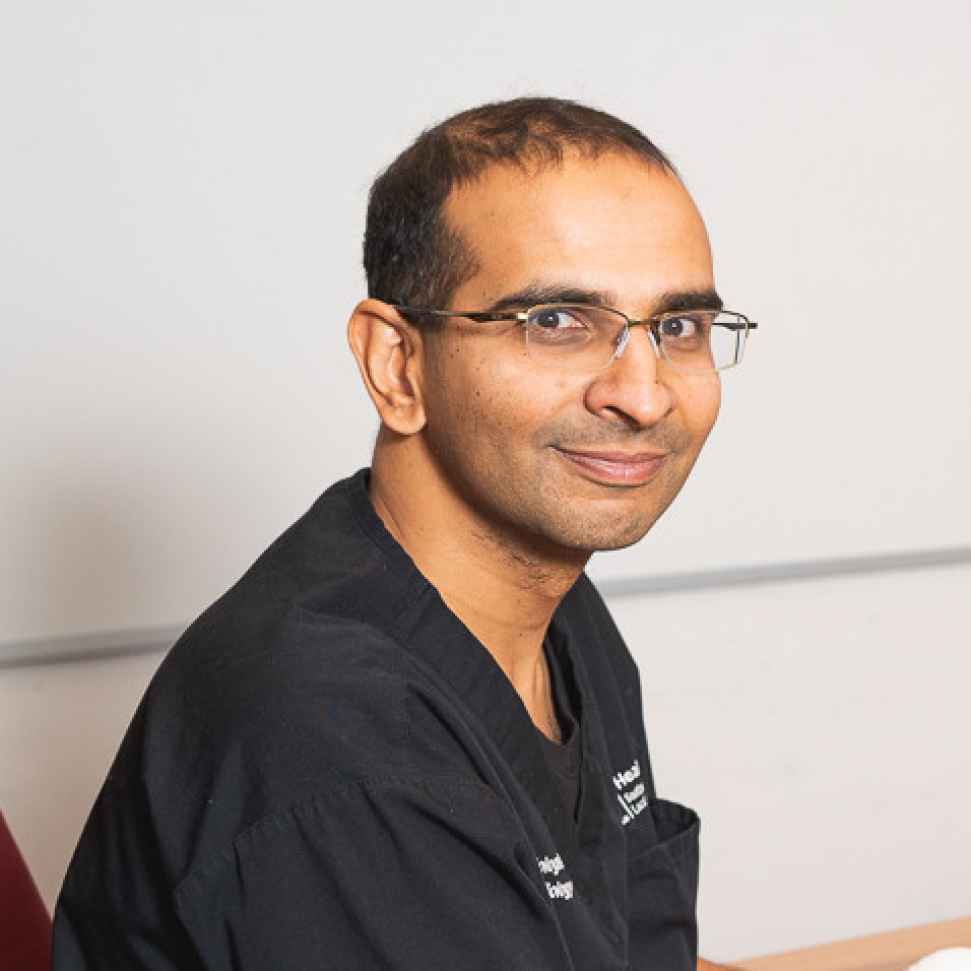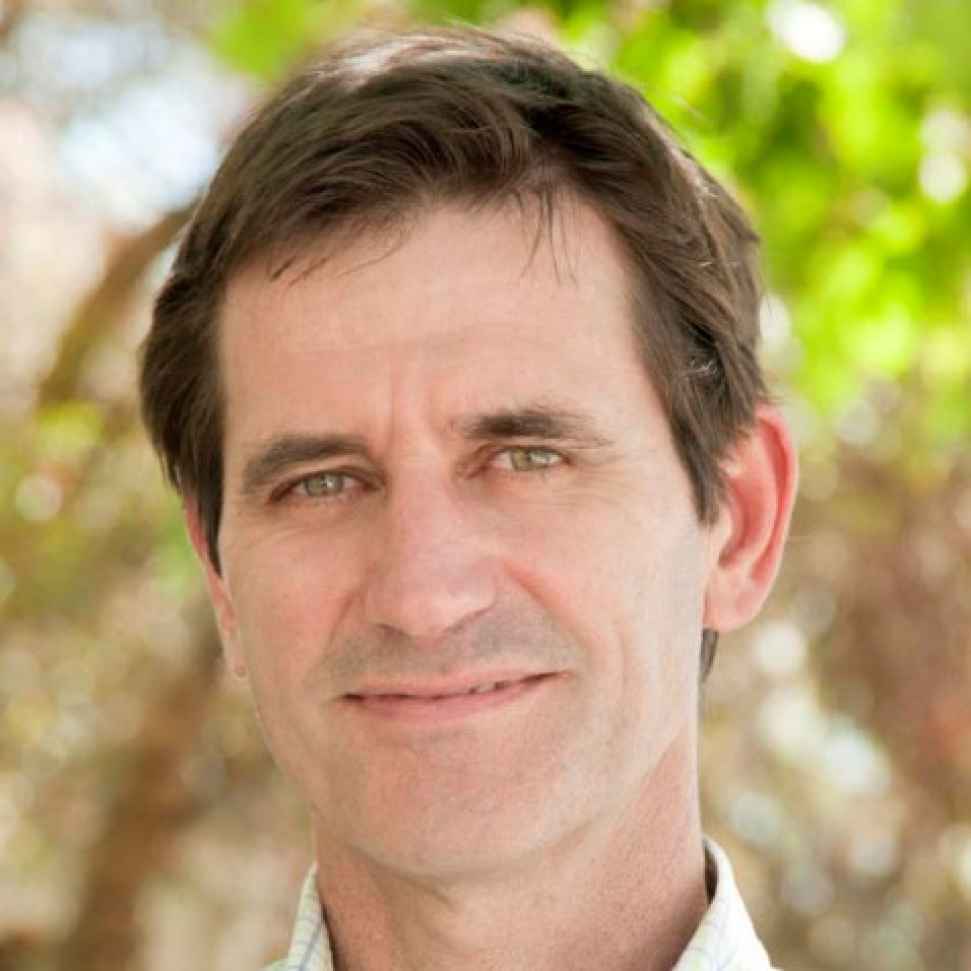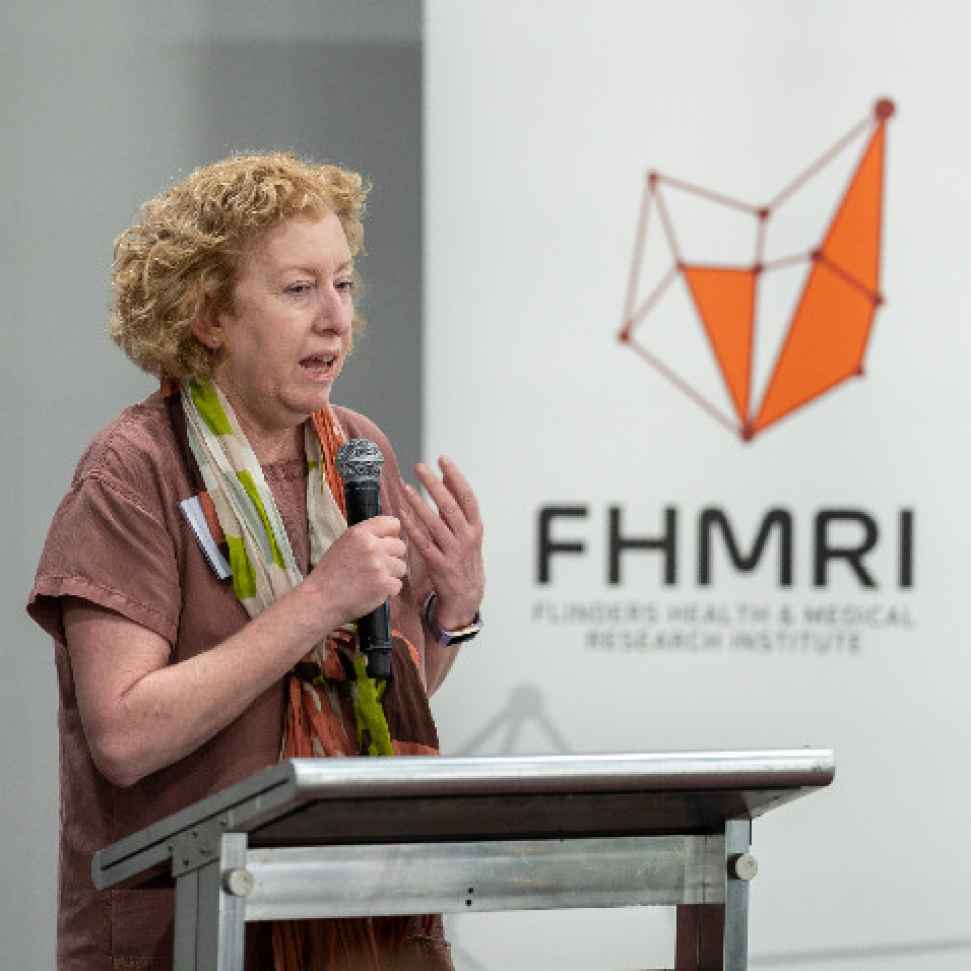Clinical
Translation
We champion the work of our researchers in the most important way: by facilitating the flow of new knowledge from the lab and into the clinic.
Our tireless efforts to prevent, diagnose and treat disease and improve health will be shared with clinicians and patients faster through our innovative and collaborative research methods, co-location with Flinders Medical Centre and private hospital, and our strong partnerships with rural and remote communities.
We are forming relationships and listening to our partners to understand their health needs. And together, we believe we can get life-saving knowledge into practice significantly sooner and help more Australians to live healthy lives.
Research programs
Clinicians, researchers and nurses are working together to enhance understanding about blinding eye conditions. Cataracts, diabetic retinopathy, glaucoma and uveitis infections are just some of the conditions we are researching, and all include a focus on translating evidence-based discoveries into clinical care to improve eye and vision health.
Flinders University started, and continues to run, the world’s largest registry of human corneal transplants. This collection of more than 37,000 records provides valuable information that informs clinical practice and helps surgeons identify risk factors for potential poor patient outcomes. The registry is a growing bank of information, with surgeons contributing new graft information that when pooled with the Australian-wide data can help surgeons identify new insights into possible causes of failure or improve outcomes for future patients.
Our heart and vascular health researchers work within the Flinders Medical Centre’s Cardiac and Thoracis Surgery and Department of Vascular and Endovascular Surgery academic units.
Researchers and surgeons work together in these units to provide specialist care to southern Adelaide, Darwin and in many country centres.
We are working on new and emerging technologies and assessing efficacy of new treatments and we are conducting research including vascular imaging techniques, emerging endovascular technologies and exercise therapies so that surgeons have the highest quality and latest medical advances available to them, and their patients have the best available care.
Our research is conducted by psychiatrists and mental health clinicians from all disciplines in consultation with consumers and carers.
Our researchers include the new disciplines of Behavioural Health and Digital Psychiatry and our core partners at Southern Adelaide Local Health Network Mental Health Service and at SAHMRI.
We focus on a broad range of research from basic science to implementing research findings into clinical practice, and from biological to psychological treatments of mental illness. These research programs include the genetics of depression, finding out how medications work in the laboratory and through genetic testing, and developing bio markers, particularly EEG (electrical impulses) for people with psychosis, (ie schizophrenia and bipolar disorder).
Our clinical research focuses on the factors and interventions that influence human behaviour. Our current trials include testing the role of the Flinders self-management program in helping people with long-term psychosis to improve their cardiovascular health and we are Australian leaders in testing models of low intensity cognitive behavioural therapy for anxiety and depression delivered by community members and in cognitive behaviour therapy for people with Gambling Disorders.
Our ground-breaking digital research is testing how mobile phones can provide real time monitoring of mood, activity, sleep and other physical measures as well as provide online interventions to assist people with mental illness.
Underpinning these various research themes is the development of a registry to monitor people with distress and mental illness over the long-term, which will underpin our established expertise in using research to design new models of care in hospitals and the community, including major contributions to the Victorian Royal Commission into mental illness.
Four out of ten Australians are not getting an adequate night’s rest. This has adverse effects on all aspects of health and increases risk of disease. We are conducting world-leading research to remove barriers to a good night’s sleep.
Our sleep research is producing innovations in sleep apnoea and insomnia treatments with a focus on improving access to these treatments for all Australians. A multi-disciplinary team are working on a five-year project to redesign, test and reorganise health care practices so sleep disorder diagnosis and treatment can be delivered by GPs, and maybe in a patient’s own home, to reduce reliance exclusively on expensive sleep specialists. We continue to combine clinical, physiology, psychology and engineering expertise on our wide range of current sleep research initiatives.
Australians are living longer and increasing numbers live beyond 80. Avoiding or delaying disability and staying at home and active within the community is a priority for older people. At Flinders, our multidisciplinary team of doctors, allied health therapists and health service researchers examines approaches to rehabilitation for people with disability associated with ageing as well as recovery after illnesses such as stroke and hip fracture. We are embedded inside Flinders Medical Centre’s large rehabilitation service and work closely with clinicians and patients to examine the value and effectiveness of different care approaches including the use of telehealth and technologies.
The number of people with dementia is also rising and the impact of dementia is felt by not only the person but their family and friends. A unique Australian site is being developed at the Repat Precinct for people with dementia. It will include an aged care village as well as hospital wards for patients with dementia and sports and arts facilities. This provides a unique site for research examining families’ experiences with health and aged care services. Our research works with industry partners and consumers to develop and evaluate family-based programs to improve quality of life.
THEME LEAD

Professor Justine Smith
FHMRI Deputy Director (Theme Lead, Clinical Translation)
Professor Justine Smith is an internationally recognised expert in the causes, effects and treatment of uveitis – inflammation of the eye. Her work extends to infection by parasites and viruses, and ocular cancers.
Through her research, important discoveries on the mechanisms of infectious uveitis have been made, while her laboratory research and the associated clinical trials have supported the use of biologic drugs to reduce vision loss from non-infectious uveitis.
Professor Smith is a Research Strategic Professor at Flinders University, Principal Research Fellow at SAHMRI, Fellow of the Australian Academy of Health and Medical Sciences, and Chair of the Academia Ophthalmologica Internationalis. She is Executive Vice-President of the Association for Research in Vision and Ophthalmology, the world’s largest eye and vision research organisation, a past President of the American Uveitis Society, and serves on Boards of the International Council of Ophthalmology and the International Ocular Inflammation Society.
In 2017 Professor Smith was named a Superstar of STEM by Science and Technology Australia and is a passionate advocate for supporting girls and women to pursue careers in science.
![]()
Sturt Rd, Bedford Park
South Australia 5042
South Australia | Northern Territory
Global | Online
CRICOS Provider: 00114A TEQSA Provider ID: PRV12097 TEQSA category: Australian University













